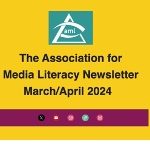Does Media Education Work?
Chris M. Worsnop
A respected colleague asked me to be one of the people to answer the question, Does Media Education Work? Here is a slightly revised version of the answer I sent.
What a question! The answer will of course depend on what people expect media education to achieve before they will acknowledge that it is working, or has worked. What will they be satisfied with?
Would it be enough for media literacy to provide a group of young people who can tell a hawk from a handsaw when it comes to looking at media texts? Who can pick out the stereotypes, spot the continuity flubs, and connect the dots when it comes to talking about screen direction and camera placement and the imaginary line? Who can separate the Coen Bros from the movie of the week on CBS, with annotated reasons and examples supplied in footnotes? Who are capable of making passable samples of media work as proof of their ability to understand how the media work? Who can deliver critical talks about the newspapers, magazines, TV programs and films in their culture? Should students be able to talk and write about and analyze the history and theory of media?
If these are the sort of outcomes expected from a media course, then it is pretty clear how to measure success. It would be pretty well the same as in any other school subject: Can the kids do the things the course of study wants them to end up capable of doing?
BUT . . .
We don’t ask if the math curriculum is working by looking at whether or not kids are getting taller. We don’t expect the writing curriculum to produce kids who avoid fatty foods. We don’t measure the geography curriculum in terms of how few of its students end up in jail. These expectations would be rightly identified as being desirable, but not reasonable to expect as a result of studying the curriculum.
There is, though, an ominous set of social engineering expectations that are frequently loaded onto the back of media education, and if the question, “Does Media Literacy Work?” is really intended to ask a question that is entirely separate from an inquiry into knowledge and understanding of, about and within the media, then my answer might be different.
If in asking “Does Media Literacy Work? the real question is one of the following:
Does media education succeed in propagandizing convergent thinking in schools to:
- stop kids from smoking?
- steer kids away from alcohol?
- prevent pregnancy among teens?
- stop kids from becoming violent?
- keep kids away from junk food and obesity?
- keep kids off drugs?
- stop kids from becoming compulsive consumers?
- stop kids minds from rotting?
- provide an antidote to (insert your favourite bugaboo here) ?
rather than simply asking the more important, all-inclusive and non-normative question: “Does media education teach kids to think for themselves – to become divergent thinkers?”
Then my answer is, “Of course not”. Expecting media education to deliver these outcomes is folly on two counts:
- it assumes that students are mere receptacles for accepted norms and have no right to make up their own minds about social issues
- it sets up media education to fail
Here is a corollary question:
If media education does not deliver the social engineering outcomes that some people claim to be within its capability, should we then cancel media education courses?
The reasons for studying media in schools ought to be related to the fact that our culture and society are no longer exclusively print-based. To pretend that we are doing a good job of preparing students to live in a modern culture without teaching them to understand and operate within the media of our own time, is to condemn cohorts of youth to the kind of role that serfs played in the middle ages when the ability to read and write was reserved to the clergy and governing classes. Print literacy was not a priority for the illiterates in history because of the deplorable state of their health, cultural habits or body size. It was a priority because without it they were disempowered in their own culture. Media education or media literacy is a similar imperative in our own culture.
Does media literacy work?
It’s not a simple question. And there are no simple answers.



